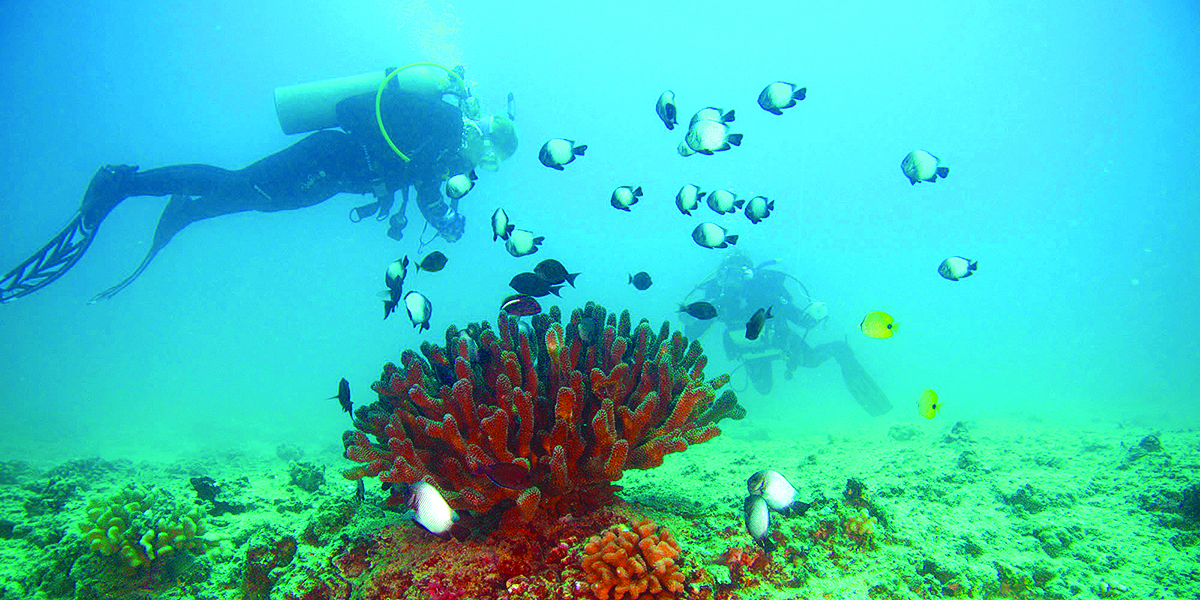Today, the University of Hawaiʻi at Mānoa’s School of Ocean and Earth Science and Technology (SOEST) announced a seven-year $50 million commitment from Dr. Priscilla Chan and Mark Zuckerberg, which will support various research groups within Hawaiʻi Institute of Marine Biology (HIMB). HIMB will leverage this gift to make meaningful progress in restoring Hawaiʻi’s ocean health.
This gift will fund research and programs that document changing ocean conditions, explore solutions to support healthier ocean ecosystems, enhance coastal resilience from storms and sea-level rise, and tackle challenges to marine organisms ranging from the tiniest corals to the largest predators.
University of Hawai‘i (UH) President David Lassner said, “This transformative gift will enable our world-class experts to accelerate conservation research for the benefit of Hawaiʻi and the world.” Lassner continued, “The ocean ecosystems that evolved over eons now face unprecedented threats from our growing human population and our behaviors. It is critical that we learn from previous generations who carefully balanced resource use and conservation. The clock is ticking, and we must fast-track not only our understanding of marine ecosystems and the impacts of climate change, but the actions we must take to reverse the devastation underway. There is no place on Earth better than Hawai‘i to do this work, and no institution better able than UH. We could not be more grateful for the investment of Dr. Priscilla Chan and Mark Zuckerberg in a better future for all of us and our planet.”
Hawai‘i is home to a rich diversity of marine life, including many threatened and endangered species. The accelerated pace of climate change and ocean acidification has altered environmental conditions faster than expected. Many species have difficulty adapting to the rapid changes taking place in the oceans and scientists see growing impacts to marine ecosystems.
The gift funds research on the impact of climate change on Hawaiian coastal waters, including areas of particular concern or natural refuges from ocean acidification effects. It will also support research on methods for more accurate forecasting of future ocean conditions, as well as efforts to study marine organisms like coral reefs, sharks, and other species.
“Hawaiʻi has one of the richest marine ecosystems in the world — and having a deeper understanding of this ecosystem is the key to preserving and protecting it,” said Mark Zuckerberg and Dr. Priscilla Chan. “We’re honored to support the University of Hawaiʻi’s conservation efforts, including their trailblazing research on coral reef restoration, the impact of climate change on coastal waters, and other areas related to the health of our oceans.”
The seven-year commitment funds research that supports healthier, more climate change-resilient coral reef ecosystems. For example, scaling up strategies for coral reef restoration. It also leverages efforts to grow community partnerships and support Indigenous resource management practices. Further, it supports training for the next generation of coral scientists and ocean conservationists.
Interim SOEST Dean Chip Fletcher points out, “In addition to the research funded through this gift, we will improve support for local students in overcoming obstacles to higher education. Through internships, mentoring, community engagement efforts and graduate research fellowships we will grow our pool of scholars, policymakers, and conservationists from underrepresented communities around our state.”
The School of Ocean and Earth Science and Technology at the University of Hawai‘i at Mānoa is a world-class research and academic institution focused on informing solutions to some of the world’s most challenging problems. Through an integrated, comprehensive, and sustained system of Earth and planetary observations, research, and education, SOEST staff work to transform the way people live on Earth by enabling a healthy public, economy, and planet. This gift also funds critical efforts to inform the public, policy makers and resource managers of ocean acidification and warming vulnerabilities.
Hawaiʻi Institute of Marine Biology Director Eleanor Sterling added, “This generous gift is a wonderful opportunity to support the much-needed interdisciplinary work that will help us to better understand ocean systems and Indigenous management strategies and to develop effective approaches for ocean conservation. We aim to make significant strides toward ensuring healthy, diverse oceans as well as meeting the needs of local communities.”
University of Hawaiʻi Foundation CEO Tim Dolan concluded, “We are tremendously grateful to Dr. Priscilla Chan and Mark Zuckerberg for their generous gift and commitment to restoring our oceans. Through their visionary generosity, our UH researchers and partners will have the essential funding needed to gain new knowledge and ultimately help our world’s oceans. The timing of this incredible investment will generate enormous momentum for UH’s ambitious capital campaign.”
Questions? / More Information
If you would like to learn how you can support UH students and programs like this, please contact us at 808 376-7800 or send us a message.
# # #
The University of Hawai‘i Foundation, a nonprofit organization, raises private funds to support the University of Hawai‘i System. The mission of the University of Hawai‘i Foundation is to unite donors’ passions with the University of Hawai‘i’s aspirations by raising philanthropic support and managing private investments to benefit UH, the people of Hawai‘i and our future generations. uhfoundation.org
The School of Ocean and Earth Science and Technology at the University of Hawai‘i at Mānoa was established by the Board of Regents of the University of Hawai‘i in 1988. SOEST brings together four academic departments, multiple research institutes, several federal cooperative programs, and support facilities of the highest quality in the nation to meet the most pressing challenges in the ocean, earth and planetary sciences and technologies.
The Hawaiʻi Institute of Marine Biology is based in the University of Hawai‘i at Mānoa’s School of Ocean and Earth Science and Technology. HIMB’s innovative science, place-based education, and deep community engagement advances knowledge and stewardship of the coasts and oceans both locally and globally. HIMB is at the forefront of scientific discovery and locally relevant solutions to global issues including coral reef health, biodiversity and sustainability; fisheries; ecology and behavior of large marine animals; and marine education and community outreach.
